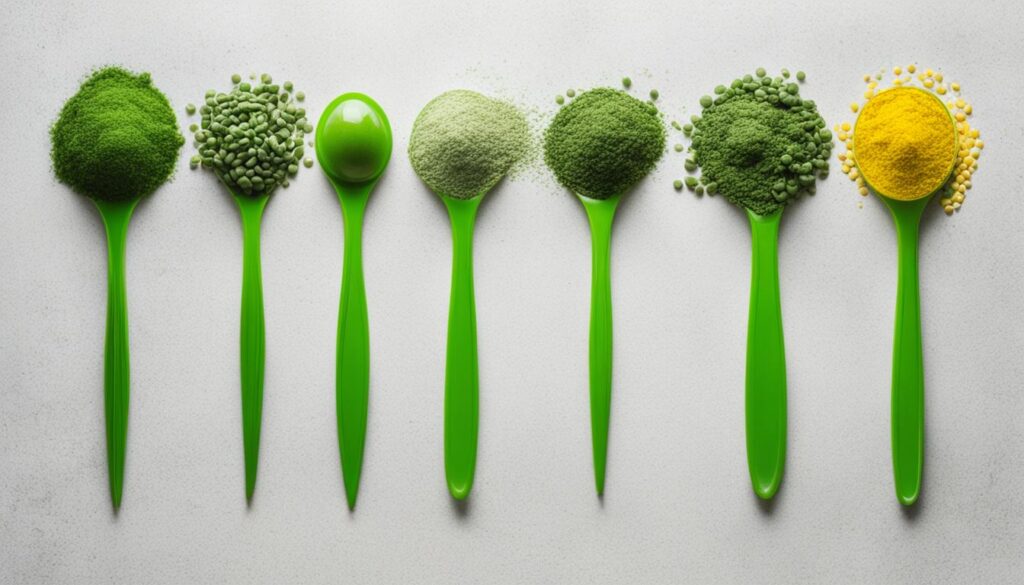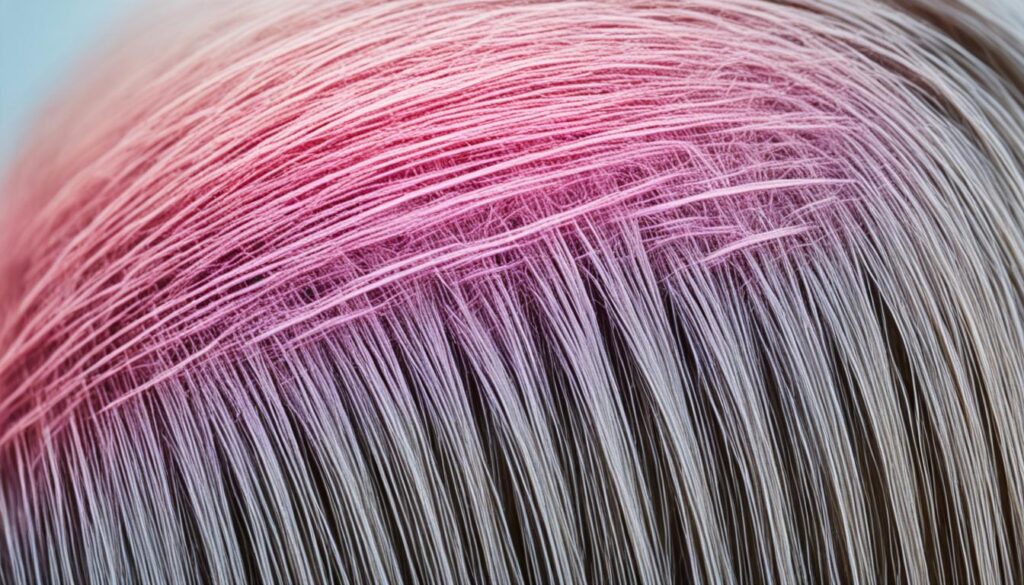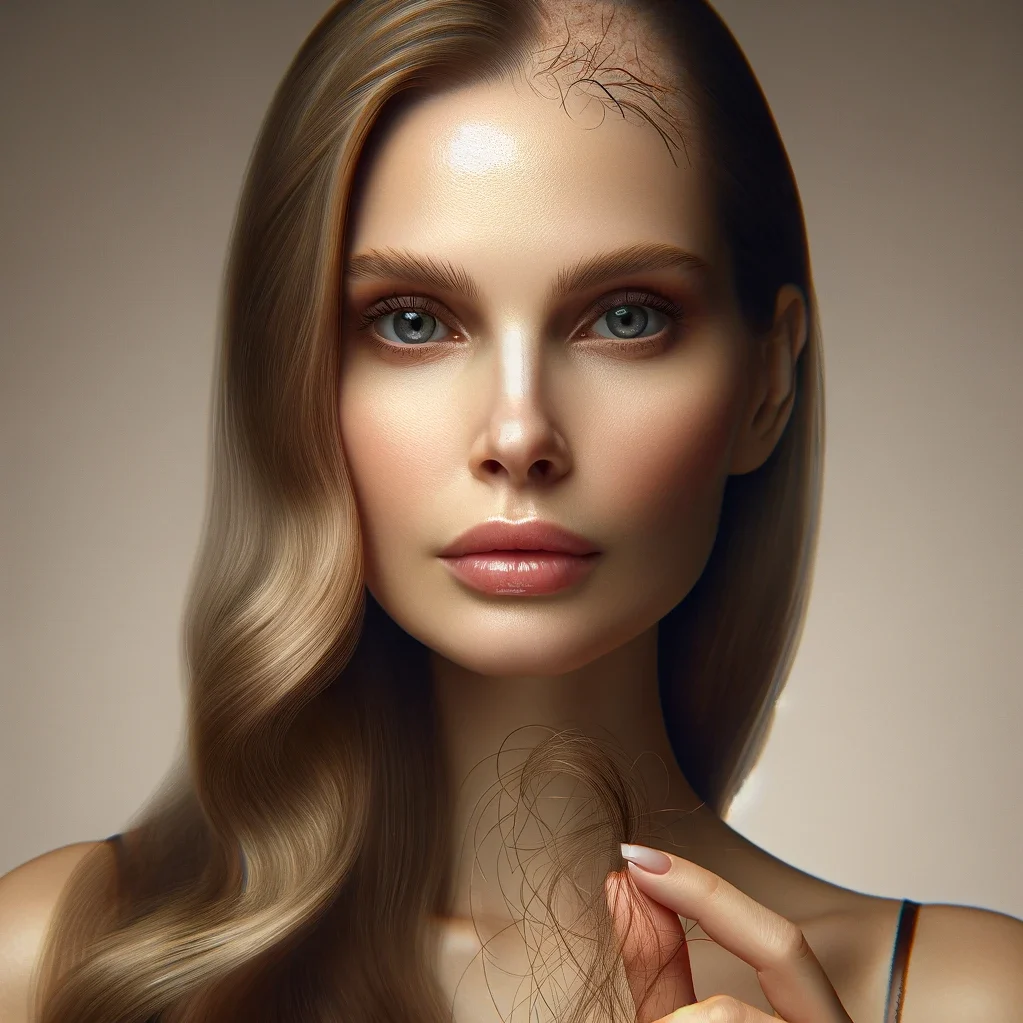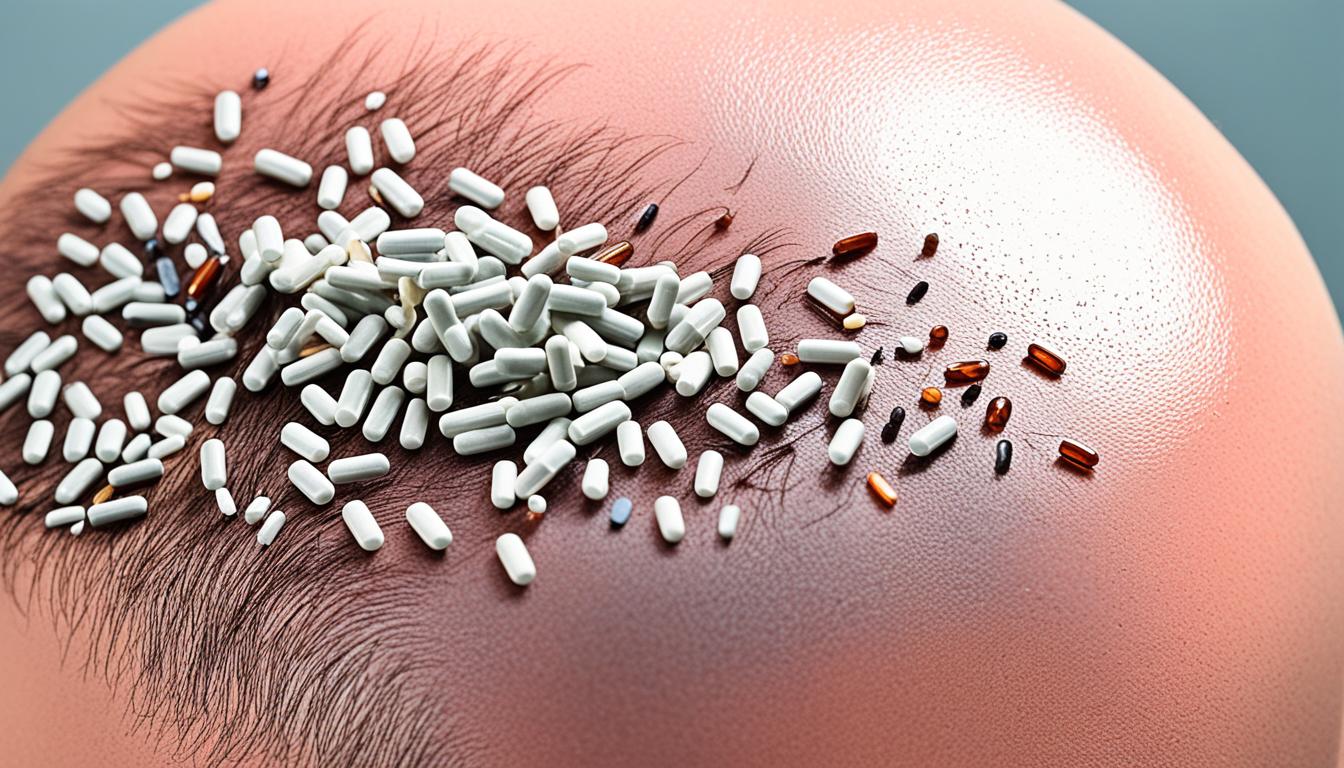If you notice your hair is losing its luster or shedding more than usual, you’re not alone. Hair loss affects millions of people worldwide, and it can be a distressing and frustrating experience. But did you know that a vitamin deficiency might be to blame? That’s right, something as simple as not getting enough of certain vitamins can have a significant impact on the health and growth of your hair.
While there are various causes of hair loss, this article will focus on the role of vitamin deficiencies and how they can contribute to this common problem. We will specifically explore the deficiencies of iron, vitamin D, and zinc, which are often linked to hair loss. It is important to understand the connection between these deficiencies and hair loss to identify potential solutions and preventive measures.
Key Takeaways:
- Vitamin deficiencies can play a significant role in hair loss.
- Iron deficiency can impact the oxygen supply to hair follicles, leading to hair loss.
- Vitamin D deficiency can disrupt the hair growth cycle and contribute to various types of hair loss.
- Zinc deficiency affects cell growth and protein synthesis, potentially leading to hair loss.
- Consulting a healthcare provider is essential before starting any supplement regimen for hair loss treatment.
Understanding Vitamin Deficiencies and Hair Loss
Vitamins are essential nutrients needed for human survival. A deficiency in any vitamin category can disrupt the body’s balance and lead to hair thinning. It is important to address vitamin deficiencies to maintain healthy hair.
One of the primary causes of hair thinning is vitamin deficiency. When the body lacks vital nutrients, it can impact the health of hair follicles, leading to weakened strands and increased hair loss. Understanding the specific vitamins that play a role in hair health is crucial for preventing and treating thinning hair.
Vitamin deficiencies can affect hair in various ways. For instance, a deficiency in iron can lead to inadequate oxygen supply to the hair follicles, causing them to become weak and resulting in hair thinning. Similarly, vitamin D deficiency has been linked to disrupted hair growth cycles, leading to shedding and slowed hair growth.
Addressing these deficiencies and ensuring an adequate intake of essential vitamins is key to promoting and maintaining healthy hair. Regularly monitoring vitamin levels and consulting with a healthcare provider is recommended to determine the appropriate supplementation, if necessary.
Importance of Vital Nutrients for Hair Health
Proper nutrition is essential for overall hair health. In addition to vitamins, other vital nutrients play a significant role in promoting strong and vibrant hair. These include:
- Protein: Hair is primarily made up of a protein called keratin. Adequate protein intake ensures proper hair growth and strength.
- Omega-3 fatty acids: Found in foods like fish, walnuts, and flaxseeds, omega-3 fatty acids nourish the scalp and help keep hair hydrated.
- Zinc: Zinc helps maintain the health of hair follicles and supports healthy hair growth.
- Biotin: Also known as vitamin H, biotin plays a vital role in the production of keratin, promoting healthy hair growth.
By maintaining a well-rounded diet that includes these vital nutrients and addressing any vitamin deficiencies, individuals can support their hair health and minimize the risk of hair thinning and loss.
“Proper nutrition plays a crucial role in maintaining healthy hair. A deficiency in essential vitamins and nutrients can contribute to hair thinning and loss.”

Iron Deficiency and Hair Loss
If you’re experiencing hair shedding or notice your hair losing its thickness, you may be dealing with iron deficiency. Iron plays a crucial role in delivering oxygen to cells, including the hair follicles. When iron levels are low, hair follicles receive less oxygen, resulting in hair loss.
Aside from hair shedding, other symptoms of iron deficiency include fatigue, brittle nails, and restless legs. If you suspect iron deficiency might be the cause of your hair loss, it’s important to consult with a healthcare provider to get a proper diagnosis.
Iron Deficiency Symptoms
Iron deficiency can manifest in various ways, including:
- Fatigue and weakness
- Brittle nails
- Pale skin
- Shortness of breath
- Dizziness and lightheadedness
- Restless legs syndrome
If you’re experiencing any of these symptoms along with hair shedding, it’s worth investigating your iron levels to determine if iron deficiency is the underlying cause.
Treatment and Prevention
The first step in addressing iron deficiency is to work with a healthcare provider to confirm the diagnosis through blood tests. Once iron deficiency is confirmed, treatment typically involves increasing iron levels through iron-rich foods and, if necessary, iron supplementation.
Here are some iron-rich foods you can incorporate into your diet:
- Red meat
- Shellfish
- Beans and lentils
- Spinach and other leafy greens
- Tofu
- Quinoa
Remember that iron absorption can be affected by various factors, such as the presence of certain medications or dietary choices. It’s important to work closely with your healthcare provider to determine the appropriate dosage and address any factors that may hinder iron absorption.
By addressing iron deficiency and ensuring adequate iron intake, you can help promote hair growth and prevent further hair loss.

Vitamin D Deficiency and Hair Loss
Vitamin D plays a vital role in the hair follicle growth cycle. When there is a deficiency of this essential vitamin, it can disrupt the normal functioning of hair follicles and lead to various types of hair loss. Notably, conditions such as alopecia areata and female pattern hair loss have been associated with low levels of vitamin D. Therefore, it is crucial to address vitamin D deficiency to promote healthy hair.
While sunlight is a natural source of vitamin D, certain individuals may be at risk of deficiency due to limited sun exposure or having darker skin tones. In such cases, supplementation may be necessary to ensure adequate vitamin D levels. However, it is important to consult with a healthcare provider before starting any supplements to determine the appropriate dosage and to consider individual factors.
To prevent vitamin D deficiency and support hair follicle growth, it is also essential to incorporate vitamin D-rich sources into your diet. Foods that are good sources of vitamin D include:
| Food Sources of Vitamin D |
|---|
| Fatty fish such as salmon, mackerel, and sardines |
| Egg yolks |
| Mushrooms |
| Fortified dairy products and plant-based milk alternatives |
Remember, maintaining healthy vitamin D levels through proper sun exposure and a balanced diet can contribute to the overall health of your hair follicles and help prevent hair loss related to vitamin D deficiency.
Key Takeaways:
- Vitamin D deficiency can disrupt the hair follicle growth cycle and contribute to hair loss.
- Low levels of vitamin D have been associated with conditions like alopecia areata and female pattern hair loss.
- Supplementation may be necessary for individuals at risk of vitamin D deficiency, such as those with limited sun exposure or darker skin tones. However, consulting with a healthcare provider is important to determine the appropriate dosage.
- Incorporating vitamin D-rich foods into your diet, such as fatty fish, egg yolks, mushrooms, and fortified dairy products, can also help maintain healthy vitamin D levels.
Zinc Deficiency and Hair Loss
Zinc deficiency can have a significant impact on hair health, leading to hair loss. This essential mineral plays a crucial role in cell growth, protein synthesis, and immune function, all of which are necessary for maintaining healthy hair follicles. When zinc levels are low, hair follicle repair and growth are compromised, resulting in hair loss.
Recognizing the signs of zinc deficiency is essential in addressing hair loss concerns. Symptoms of zinc deficiency may include diarrhea, weakened immunity, and hair loss. By replenishing zinc levels through supplementation or consuming zinc-rich foods, individuals can promote hair follicle repair and stimulate hair regrowth.
Consulting with a healthcare provider is crucial when considering zinc supplementation for hair loss. They can help determine the appropriate dosage based on individual needs and monitor for any potential side effects. Additionally, incorporating zinc-rich foods into the diet, such as oysters, beef, pumpkin seeds, and spinach, can naturally boost zinc levels and support overall hair health.
FAQ
Can a vitamin deficiency cause hair loss?
Yes, a vitamin deficiency can contribute to hair loss. The most common deficiencies linked to hair loss are iron, vitamin D, and zinc. It is important to address these deficiencies to maintain healthy hair.
How does iron deficiency cause hair loss?
Iron deficiency can lead to hair loss as it reduces the oxygen supply to cells, including hair follicles. Symptoms of iron deficiency include fatigue, brittle nails, and restless legs. Treatment involves restoring iron levels through iron-rich foods and supplementation.
Can a vitamin D deficiency affect hair growth?
Yes, vitamin D deficiency can disrupt the hair follicle growth cycle and has been linked to various types of hair loss. Supplementing with vitamin D may be necessary for those at risk of deficiency, such as people with limited sun exposure or darker skin tones.
How does zinc deficiency contribute to hair loss?
Zinc deficiency can contribute to hair loss as it is involved in cell growth, protein synthesis, and immune function. Symptoms of zinc deficiency include diarrhea, weakened immunity, and hair loss. Supplementing with zinc can help reverse hair loss in individuals with a deficiency.

